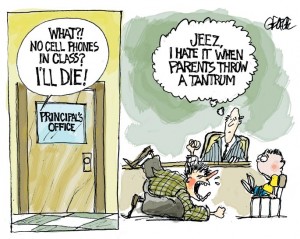I often ask parents, “What kind of people do you want your kids to grow up to be?” “Honest” is always in the top five. We don’t want our kids peddling lies and deception (not in relation to us or their teachers or their friends). Being honest is a good thing. Yeah. Glad we all agree.
But we parents have a problem. The President-elect regularly lies loudly and proudly with impunity. Face it, he won the Presidency of the United States of America, in part, by spouting crappola like “Barak Obama and Hillary Clinton are co-founders of ISIS.” And “Climate change is a hoax invented by the Chinese.” And “Hillary Clinton started the Birther Movement and I stopped it.” Since Election Day he’s continued with baseless claims like: “There was ‘serious voter fraud’ in California.” and…. never mind.
If you’re not outraged you haven’t been paying attention. But you have. I know you have. But too many folks gobble up any and all of what He says. No questions asked. Seriously?
We have veered off the trail. Maybe you wanted change. Maybe you’re cool with the fact that the truth as we know it has been left behind. Doesn’t matter if we’re cool with it or not. The truth is, all of us are now being led by a person who either doesn’t know the difference between fact and fiction or cynically lies for self-aggrandizement as well as the perverse rush he gets in sowing seeds of discord to solidify his Rule by Fear.
I miss Obama already. And Michelle. And Joe Biden.
Wonder what Obama thinks of all this. Ira Glass and the team at This American Life wondered, too. They asked singer/songwriter Sara Bareillis to imagine what President Obama might be thinking about the election and Trump but can’t say publicly. Leslie Odom, Jr (Tony Award-winning actor for his role as Aaron Burr in the musical Hamilton). performs the song (with lyrics displayed) It blows me away every time I watch and listen. I try to remain hopeful. It’s hard. But we’ve got to work on it. And stay politically active. Seriously.













